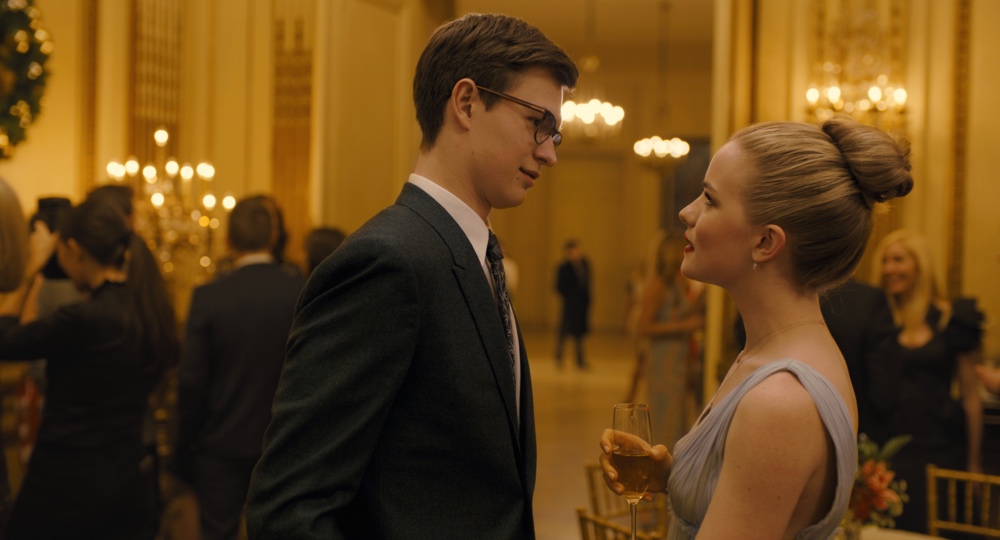
MARCUS CHEONG watches ‘The Goldfinch’…
The Goldfinch (AU – M/UK – 15/US – R)
In a Word – Sprawling

Ansel Elgort stars as Theo Decker and Willa Fitzgerald as Kitsey Barbour in The Goldfinch. PICTURE: Warner Bros Pictures.
The 2013 novel by Donna Tartt, The Goldfinch, spent more than 30 weeks on New York Times bestseller list and has won numerous awards including the Pulitzer Prize. Director John Crowley (Brooklyn) translates this ambitious story to the big screen with an impressive line up of stars that include, Ansel Elgort (The Fault in Our Stars, Baby Driver, The Divergent Series), Nicole Kidman (The Hours, Big Little Lies, Aquaman), Luke Wilson (Idiocracy, Legally Blonde), Sarah Paulson (Ocean’s Eight, 12 Years a Slave, Glass) and Finn Wolfhard (Stranger Things, It).
The Goldfinch may not be the most entertaining film of the year but it is one of the most profound. It explores the paradox of life that is both random and serendipitous, where there is both cruelty and love. Theo Decker is shaped by loss, pain, and guilt, but the miracle that is celebrated in The Goldfinch is how faithful relationships, repentance and destiny can lead our lives to freedom.
Thirteen-year-old Theo Decker (Oakes Fegley, later played by Ansel Elgort) suffers the tragic loss of his mother when a bomb explodes at the Metropolitan Museum in New York. He is taken in by the wealthy Barbour family led by the compassionate Samantha Barbour (Kidman) and begins to experience love and family once more.
That is, until his absentee father (Wilson) and dubious girlfriend (Paulson) take him away to a desolate part of Las Vegas. His only companion there is Ukrainian immigrant Boris (Finn) and the two begin to bond over their losses, loneliness and drugs. The narrative of these younger years alternates with scenes from the future, where the adult Theo is now an antique dealer in New York. The secrets that surround his life begin to unfold and there are shocking revelations that involve his love life, his career and a precious painting stolen from the Met Museum all those years ago, titled The Goldfinch.
The complex narrative jumps from different times and places requiring a firm concentration to follow the plot threads. While initially confusing, the scope of the tale effectively demonstrates the power of time to change people and circumstances. True to the novel, the perspective of the film is always from Theo’s point of view. This creative choice means the film is far less dramatic than it could be. While the plot involves many dramatic incidents such as explosions, car accidents, shipwrecks and police raids, almost none of this is seen on the screen. Instead, the events are revealed by Theo’s reaction to such news, resulting in a very understated and personal tone.
The painting at the heart of the film depicts a bright goldfinch chained to a wall perched atop a box. Some speculate that it represents the paradox of freedom chained down and the tragedy for beauty to be hidden in a box. The painting itself has a miraculous tale, as it survived a massive explosion in 1654 that killed over hundred people, including the painter, Fabritius. The painting has thus become a symbol of the enduring power of art to survive through the ages despite the death and devastation that surrounds it.
The film expands the symbolism of the painting by weaving together a tale that demonstrates the transience of life, the inevitability of death and the power to endure a tragedy. There is wisdom in the underlying idea that there are things that survive our mortal lives and that is what is truly precious. Whether it be great art, antiques or the legacy of a person – these are the treasures that should not be hidden or chained but set free for all to appreciate.
The Goldfinch may not be the most entertaining film of the year but it is one of the most profound. It explores the paradox of life that is both random and serendipitous, where there is both cruelty and love. Theo Decker is shaped by loss, pain, and guilt, but the miracle that is celebrated in The Goldfinch is how faithful relationships, repentance and destiny can lead our lives to freedom.





